Home Remedies for Allergies — Find Relief Without Drugs

Ah choo! Are you are looking for relief from the itchy eyes, sneezing, runny nose and other discomforts associated with airborne or seasonal allergy?
In this post you will find a list of home remedies that you might want to try as an alternative to using medications. You will also find a couple of healthy and effective beverages for reducing allergies naturally.
In this article we are primarily going to talk about allergic rhinitis, caused by dust, mold, pollen and other natural substances.
Many people with such issues often turn to over-the-counter drugs, including antihistamines, seeking for some relief. The main problem with these medications is related to their undesired side-effects. For example, drowsiness is one frequent side-effect of prescription medication for allergies. Other include dry mouth, diarrhea, headache, and dizziness.
It might be a good strategy to try some home remedies first and see if they can help totally eliminate the problem… or at least alleviate the symptoms without any unwanted side effects. Read on to learn more!
Table of Contents
The Cause of Allergic Reactions
With this type of allergies, the immune system goes out of control. Dust, pollen, and other allergens are not harmless on their own, however, the problem occurs because your immune system interprets them as foreign substances. When that happens your body starts to build an immune response against these substances.
So, when you get itchy eyes, sneezing, breathing difficulties, coughing, hives, and rashes — it is because the immune response of your body is strong and goes haywire.
In fact, on average, one in five Americans suffers from airborne allergies.

The important general rule to remember here is that all allergic reactions are inflammatory. The puffy eyes, skin rashes, swollen throats, and similar symptoms are clear signs of inflammation. Therefore, everything that can help you reduce inflammation is potentially a cure for allergy.
An allergic response is followed by a release of histamine. Antihistamine drugs can help you treat the symptoms, but the cause, which is the misidentification of the allergen as a treat, is not addressed.
Here are several types of allergic rhinitis.
Allergy to the Dust Mite
Probably the most common household allergy is allergy to the dust mite.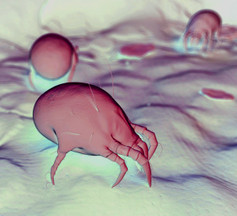
I bet you didn’t know that dust mites in the same family as ticks and spiders?
As many as one quarter of all households harbor dust mites…
…with them being slightly less common in the West.
Did you also know that it isn’t the live dust mites the root cause of allergies. Rather the fecal matter that mites expel and the dead dust mites are. GROSS!
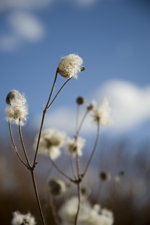 Allergy to Pollen
Allergy to Pollen
Pollen allergies are also very common. Regardless of where you live, you are bound to come in contact with pollen with some regularity each year.
Allergy to Mold
Mold is another very common allergen. It tends to happen with higher probability in certain parts of the United States. The health consequences (not only allergies) could be devastating.
Home Remedies to Try
It could be virtually impossible to avoid airborne allergens. But what you could do is try to help yourself. Check out the following home remedies for allergies. Try some of them and see how your body reacts.
- Air-condition your car and house. This keeps humidity low and prevents the build-up of mold and dust mites. It also helps seal your car and home off from the pollen found outside. If possible, make your home and car an oasis, where exposure to pollen, mites and mold is limited. [1]
- Dehumidifiers and air filters also play a role in keeping airborne allergens out of your home sanctuary. HEPA (high-energy particulate-arresting) filters are the most efficient [2]. Dust mites and molds don’t grow well in areas of low humidity [1].
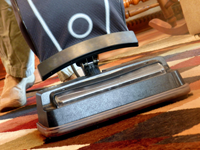
- HayFever Fighter is an awesome homeopathic remedy. HayFever Fighter™ is a homeopathic remedy for temporarily relieving symptoms including sneezing, runny nose and itchy, watery eyes.[3]
- Keep things clean… but not just with a dust cloth. In fact, don’t use a dry dust cloth at all. It just sends those dust particles swirling into the air. Use a slightly damp cloth and wipe down all surfaces frequently to prevent the build-up of dust and dirt.
- On that same note about cleaning…stick with natural cleansers like baking soda and vinegar. Avoid harsh chemicals which can irritate the airwaves and make things worse.
- Delegate chores like dusting or vacuuming to non-allergic members of your family, or if you absolutely must do them yourself, wear a face mask.
- If things are really bad, encase your pillows and bed in allergy-proof covers and wash all linens in very hot water. Water which is greater than 130 degrees does a better job of killing dust mites and removing their residue [1]. Of course, take extra caution to avoid burns when taking a shower/bath or washing the dishes, and if you have young children, it’s still best to keep your hot water heater set at a safe temperature.
- Replace your carpets with throw rugs. Carpets are havens for dust mites and pollen and really can’t be cleaned effectively. Instead, use throw rugs which can easily be tossed in the washing machine and washed on hot temperatures.
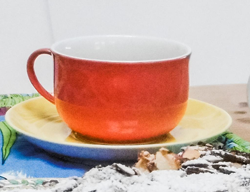 Drink wild cherry bark tea. Wild cherry bark tea is especially beneficial for upper respiratory symptoms. Buy wild cherry bark powder and use 1 tablespoon of powder for each cup of water. Then steep for 10 minutes. Drink the tea for at least 2 months and then evaluate if it seems to be working. If you feel better, you can discontinue the tea.[1]
Drink wild cherry bark tea. Wild cherry bark tea is especially beneficial for upper respiratory symptoms. Buy wild cherry bark powder and use 1 tablespoon of powder for each cup of water. Then steep for 10 minutes. Drink the tea for at least 2 months and then evaluate if it seems to be working. If you feel better, you can discontinue the tea.[1]- Eyebright is one of the best home remedies for allergies. [4] The eyebright herb contains nutrients, and organic substances that are great not only for the eye related problems, but for treating other health conditions.It is great for symptom relief… especially itchy, watery eyes, runny nose and sneezing. Take 20 drops of tincture diluted in water when you need relief.[1]
- The stinging nettle plant is probably the most popular of all home remedies for allergies and hay fever. One source recommends taking 500 mg, three times a day… and you can go even higher if needed.[1] I personally love Stinging Nettle Capsules. Using nettle might temporarily increase the severity of your symptoms for a few days… it gets worse before it gets better. However, the great news is that unlike many allergy medications, nettle does not have any side effects or cause drowsiness.[1]
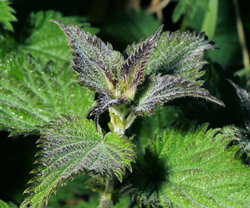 Take capsaicin (the active component of chili peppers) with nettle in the convenient form of Allergy Buster Liquid. This home remedy combines these two powerful substances for awesome relief. [5]
Take capsaicin (the active component of chili peppers) with nettle in the convenient form of Allergy Buster Liquid. This home remedy combines these two powerful substances for awesome relief. [5]- Take QUERCETIN plus VITAMIN C Capsules. DihydroQuercetin (a flavonoid with strong anti-oxidant action) is especially effective for hay fever. Together with vitamin C it provides powerful, synergistic action, than either of them alone .A suggested dosage is 200-500 mg 3 times/day.[1] Start taking quercetin up to a week before hay fever season starts in your area. [6]
- Quercetin with Bromelain is also a super booster of the immune function. It supports a healthy histamine levels. It is a dietary supplement with bromelain added. Bromelain is a powerful enzyme from the pineapple stem. Together they deliver a natural combination of substances to help manage seasonal discomfort. [7]
- Vitamin C on its own right is also very important in the prevention of allergies. Many people find that taking high doses of Vitamin C and consuming lots of Vitamin C Foods prevent allergies. Consult with your doctor for the right dosage, but it has to be much higher than the RDA recommended dietary allowances for vitamin C in order to be effective. The key to relief seems to lie in taking large quantities of Vitamin C spread throughout the day.
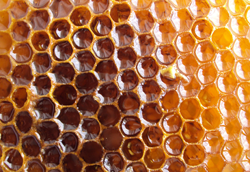 Raw Honey from a local source is one of the frequently cited remedies for allergies. It has to be RAW and LOCAL if you want it to be effective. Some people start this treatment by eating about a tablespoon of honey a day about one month BEFORE the start of hay fever season. If you don’t want to do that, you can start when you feel the first symptoms of allergy season. In that case, the best option is to start small, something like one quarter of teaspoon and increase the dose gradually. The idea behind this home made treatment is that local pollen is being used to make the honey from the beginning. That way you are essentially taking a therapeutic dosage for desensitization. This honey has important enzymes (enzymes are killed by heating, so use it RAW) that prevent allergies. Add a few drops of lemon juice to the tablespoon of honey for more benefits. Lemon juice has a lot of Vitamin C and is highly acidic.
Raw Honey from a local source is one of the frequently cited remedies for allergies. It has to be RAW and LOCAL if you want it to be effective. Some people start this treatment by eating about a tablespoon of honey a day about one month BEFORE the start of hay fever season. If you don’t want to do that, you can start when you feel the first symptoms of allergy season. In that case, the best option is to start small, something like one quarter of teaspoon and increase the dose gradually. The idea behind this home made treatment is that local pollen is being used to make the honey from the beginning. That way you are essentially taking a therapeutic dosage for desensitization. This honey has important enzymes (enzymes are killed by heating, so use it RAW) that prevent allergies. Add a few drops of lemon juice to the tablespoon of honey for more benefits. Lemon juice has a lot of Vitamin C and is highly acidic.- You can use fenugreek tea to prevent allergies. It can also provide some relief from the allergy symptoms. Fenugreek Seed Tea should be consumed a month before the beginning of the allergy season and for the duration of the season as well. Other types of tea that can be very useful are green or white tea, both of which support the immune function of the body.
- Carrot broth is also one of the remedies that may help with allergies. Cover a few cut carrots with water and boil for half an hour. This carrot broth is especially rich in beta-carotene, a precursor of Vitamin A. A home made bone broth with carrots can also help
- You can use certain types of essential oil, including Chamomile, Lemon, Peppermint, Clove, Rosemary, Lavender, and Geranium Essential Oil. You can also mix several oils together. Just put several drops on a tissue (or use a personal aromatherapy inhaler) and inhale.
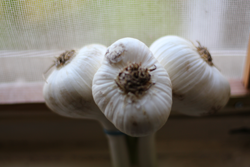 Garlic and garlic supplements can be used as a remedy for allergies. You can either eat raw garlic, or use the various garlic supplements to ward off hay fever attacks. Aged garlic extract (Kyolic) is very much recommended. It has the benefit of reducing high homocysteine levels.
Garlic and garlic supplements can be used as a remedy for allergies. You can either eat raw garlic, or use the various garlic supplements to ward off hay fever attacks. Aged garlic extract (Kyolic) is very much recommended. It has the benefit of reducing high homocysteine levels.- Calcium and magnesium are vital for the proper functioning of the nervous system during allergic attacks. Of the two, much more important is magnesium, with is acutely lacking in the modern western diet. I recommend taking magnesium supplement on a day to day basis.
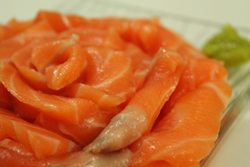 Fatty acids from the omega-3 type (EPA and DHA types [11]) are essential for human health, as they counteract inflammation in the body. Research shows these fatty acids also have strong preventive function. Despite what some experts say, plant sources of omega-3 are not that efficient. Rather, use fish oil or krill oil as your main source of daily omega 3.
Fatty acids from the omega-3 type (EPA and DHA types [11]) are essential for human health, as they counteract inflammation in the body. Research shows these fatty acids also have strong preventive function. Despite what some experts say, plant sources of omega-3 are not that efficient. Rather, use fish oil or krill oil as your main source of daily omega 3.- Echinacea and Goldenseal are two popular herbs that work in combination to support and promote immediate immune response. You can use them as supplements or in a form of Caffeine Free Tea. Both herbs work astonishingly well during the season of allergies and colds. Drink two cups of tea every day for seven days in a row. Please note, that Echinacea tea is not for persons allergic to ragweed.
Juicing and Allergies
Juicing can help primarily because it improves the immune system. However, not all juices are good.
I would primarily recommend using green juices and green smoothies, prepared by dark leafy greens, such as kale, coriander, spinach, and parsley. With their elevated doses of calcium, magnesium, and potassium, they help nourish the nervous system. To get enough juice volume, mix them with cucumbers and water.
Try adding some pineapple to your green juices and smoothies. Pineapple contains the useful enzyme Bromelain we already talked about.
You may also add lemon juice, as it contains vitamin C in its natural form to reduce the strength of the allergy.
Cabbage juice is also a great in case of allergy. It has a lot of glutamine (vitamin U) that can help you regulate your gut function.
Add turmeric to your juices. Whether you are having seasonal allergies or not. It’s a great fighter against inflammation. Turmeric with its active components helps bring into proportion the hyperactive immune system. You can also try Turmeric Ginger Tea.
Pineapple-Spinach Juice Recipe
- 1 cup of spinach
- several mint leaves
- 1 lime
- 1 small piece of ginger root
- 1 slice pineapple
- 1 medium cucumber
Proper Diet
Is there anything else you can do in addition to the above tips? Of course there is: Change Your Diet!
If you have food allergies, then everything is simple. Just cut the food that’s causing allergic reaction. With seasonal allergies, the connection is not clear. Nevertheless, you can modify the immune response of your body by changing the food you eat.
When you consider different diet plans, think about anti-inflammatory foods. Paleo or Primal Diet Types in their essence are very much anti-inflammatory.
Mark from Mark’s Daily Apple reports that many of his readers managed to dramatically reduce hay fever and other allergy symptoms when eliminating grains from their diet [12].
Other Tips
Stay away from alcohol (red and white wine seem to be the worst) and other foods that contain histamines. As a result of allergic reaction, there is already a surplus of histamine produced by your body. You don’t need some more.
Steer clear from other types of food that are obtained as a result of fermentation, including sauerkraut, cheese, ciders, and pickles.
Probiotics may help alleviate your symptoms, especially for allergic rhinitis. They do that by changing the immune response in the intestines. For more details, you can check a study [13] that summarizes different probiotic strains and their impact on allergic diseases.
The Bottom Line
From this post it’s clear that there is no simple solution to seasonal allergies.
You will have to test the home remedies given here and see which ones are right for you.
Moreover, a general change in diet can be more than welcome (and even necessary) to reduce inflammation and help your immune system.
If you eliminate the irritants that cause inflammation in your gut, your overall immune situation is improved. As a result, you are simply doing better with everything, including allergies.
Changing your diet and trying some or all of these home remedy cures for seasonal allergies is by no means a substitute for seeing your doctor, but anything that can help is by all means a great blessing!
To your health!
References
[1] The Doctor’s Book of Home Remedies, Revised and Expanded
[2] HEPA filter benefits for Allergy Relief
[3] HayFever Fighter
[8] Side effects of Antihistamines
[10] Moldy Documentary
[11] Fish and fat intake and prevalence of allergic rhinitis in Japanese females.
[12] Marks daily apple
[13] Various effects of different probiotic strains in allergic disorders
Photo by: Hermann Kaser

Leave a comment